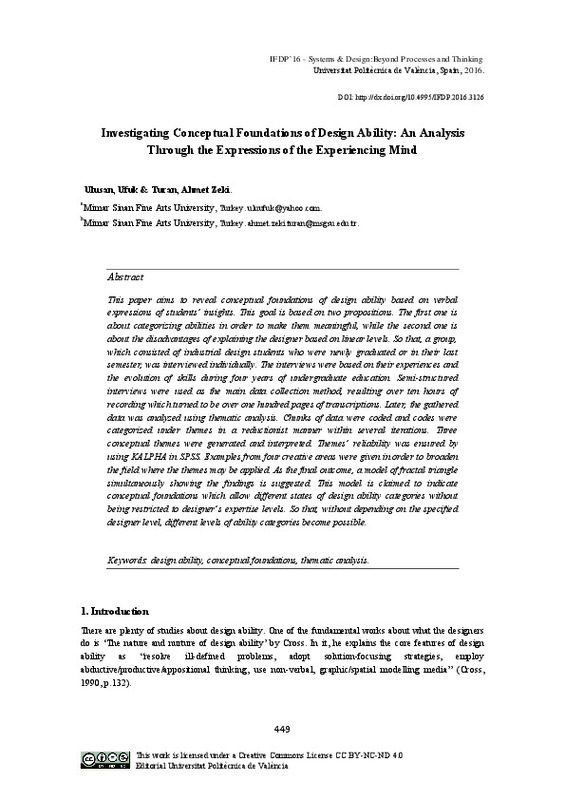JavaScript is disabled for your browser. Some features of this site may not work without it.
Buscar en RiuNet
Listar
Mi cuenta
Estadísticas
Ayuda RiuNet
Admin. UPV
Investigating Conceptual Foundations of Design Ability: An Analysis through the Expressions of the Experiencing Mind
Mostrar el registro sencillo del ítem
Ficheros en el ítem
| dc.contributor.author | Ulusan, Ufuk
|
es_ES |
| dc.contributor.author | Turan, Ahmet
|
es_ES |
| dc.date.accessioned | 2017-09-20T06:13:09Z | |
| dc.date.available | 2017-09-20T06:13:09Z | |
| dc.date.issued | 2016-10-27 | |
| dc.identifier.isbn | 9788490484401 | |
| dc.identifier.uri | http://hdl.handle.net/10251/87553 | |
| dc.description.abstract | [EN] This paper aims to reveal conceptual foundations of design ability based on verbal expressions of students’ insights. This goal is based on two propositions. The first one is about categorizing abilities in order to make them meaningful, while the second one is about the disadvantages of explaining the designer based on linear levels. So that, a group, which consisted of industrial design students who were newly graduated or in their last semester, was interviewed individually. The interviews were based on their experiences and the evolution of skills during four years of undergraduate education. Semi-structured interviews were used as the main data collection method, resulting over ten hours of recording which turned to be over one hundred pages of transcriptions. Later, the gathered data was analyzed using thematic analysis. Chunks of data were coded and codes were categorized under themes in a reductionist manner within several iterations. Three conceptual themes were generated and interpreted. Themes’ reliability was ensured by using KALPHA in SPSS. Examples from four creative areas were given in order to broaden the field where the themes may be applied. As the final outcome, a model of fractal triangle simultaneously showing the findings is suggested. This model is claimed to indicate conceptual foundations which allow different states of design ability categories without being restricted to designer’s expertise levels. So that, without depending on the specified designer level, different levels of ability categories become possible. | es_ES |
| dc.format.extent | 17 | es_ES |
| dc.language | Inglés | es_ES |
| dc.publisher | Editorial Universitat Politècnica de València | es_ES |
| dc.relation.ispartof | Systems&design:beyond processes and thinking | es_ES |
| dc.rights | Reconocimiento - No comercial - Sin obra derivada (by-nc-nd) | es_ES |
| dc.subject | Design ability | es_ES |
| dc.subject | Conceptual foundations | es_ES |
| dc.subject | Thematic analysis | es_ES |
| dc.title | Investigating Conceptual Foundations of Design Ability: An Analysis through the Expressions of the Experiencing Mind | es_ES |
| dc.type | Capítulo de libro | es_ES |
| dc.type | Comunicación en congreso | es_ES |
| dc.identifier.doi | 10.4995/IFDP.2015.3126 | |
| dc.rights.accessRights | Abierto | es_ES |
| dc.description.bibliographicCitation | Ulusan, U.; Turan, A. (2016). Investigating Conceptual Foundations of Design Ability: An Analysis through the Expressions of the Experiencing Mind. En Systems&design:beyond processes and thinking. Editorial Universitat Politècnica de València. 449-465. https://doi.org/10.4995/IFDP.2015.3126 | es_ES |
| dc.description.accrualMethod | OCS | es_ES |
| dc.relation.conferencename | Systems & Design: Beyond Processes and Thinking | es_ES |
| dc.relation.conferencedate | June 22-24,2016 | es_ES |
| dc.relation.conferenceplace | Valencia, Spain | es_ES |
| dc.relation.publisherversion | http://ocs.editorial.upv.es/index.php/IFDP/IFDP/paper/view/3126 | es_ES |
| dc.description.upvformatpinicio | 449 | es_ES |
| dc.description.upvformatpfin | 465 | es_ES |
| dc.type.version | info:eu-repo/semantics/publishedVersion | es_ES |
| dc.relation.pasarela | OCS\3126 | es_ES |








